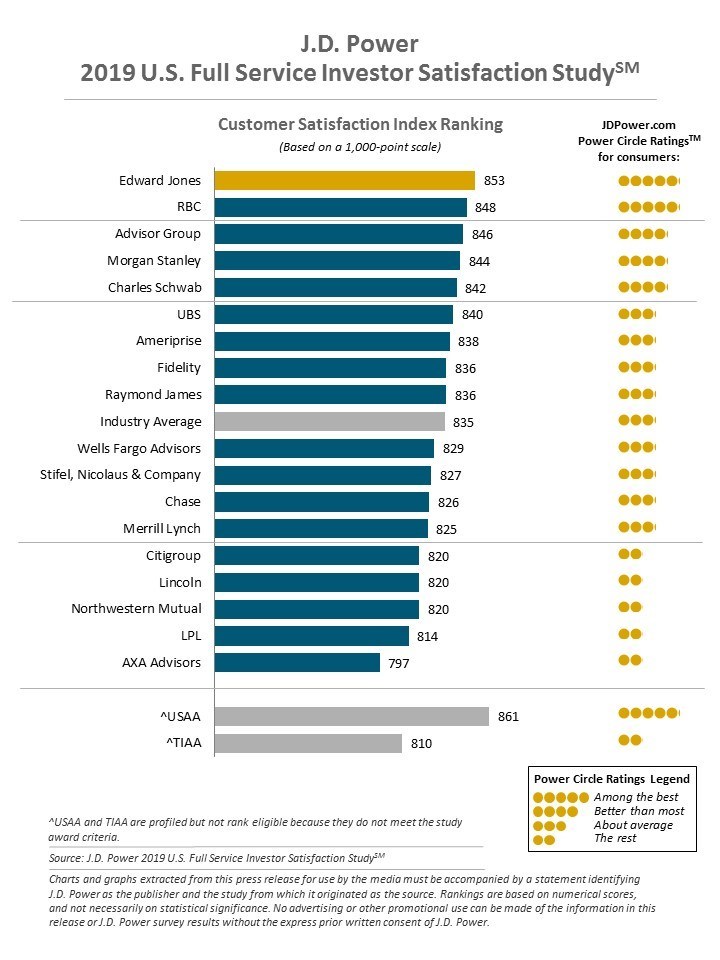
Findings from the J.D. Power 2019 U.S. Full Service Investor Satisfaction Study provide compelling data about investors' increasingly negative perceptions of their investment performance, which affects their future investment intentions and, ultimately, firms' overall performance.
The study was conducted in December 2018 when market volatility was at a four-year high and many investors were experiencing the worst returns since the financial crisis.
Not surprisingly, investor satisfaction suffered, but amidst that struggle, important insights about what separates the best advisors in any market have emerged.

"In recent years, investor satisfaction with full-service advisors and wealth management firms had been buoyed by the prolonged bull market, but with challenging markets returning investors are increasingly reexamining the value of their advisor relationships," said Mike Foy, Senior Director of Wealth Intelligence at J.D. Power. "What we have found is that it's not enough just to maintain frequent communication with clients; advisors also need to effectively explain and manage expectations around performance. It can be a difficult conversation when clients are losing money, but advisors who fail to have those hard conversations are putting at risk both their future growth opportunities, resulting in reduced client referrals and, in more extreme situations, losing their current clients either to other advisors or to alternative service models."
Following are some of the key findings of the 2019 study:
- Increased investor flight risk: Among investors whose advisor explained their 2018 investment performance, more than half (53%) indicate they "definitely will" recommend their advisor vs. 24% among those who did not receive an explanation of their performance. Additionally, while only 10% of the former group "definitely will" or "probably will" consider switching firms over the next year, that percentage doubles to 20% among the latter group.
- Performance declines affect high net worth satisfaction and loyalty: Since 2018, overall satisfaction with investment performance has declined 46 points (on a 1,000-point scale), but among high net worth investors (those with $1 million or more in investable assets), the decline is 66 points. Wealthier investors not only have more to lose when markets decline, but also this group tends to be older, so they have a shorter time horizon for when the assets are needed, which can amplify the perceived effect.
- Boomers have increasing concerns about financial well-being: Three-fourths (75%) of Boomers and Pre-Boomers1indicate they are the same or worse off than last year, up from 58% in 2018. This change in sentiment can affect the bottom line, as the percentage of investors who "definitely will" recommend their primary firm drops from 64% among those who say they're "better off" to 49% among those who say they're "about the same" and 41% among those who say they're "worse off."
- The missing digital link: Given the critical importance of effective communication across channels, it is vital that firms upgrade investors' perceptions of their mobile capabilities. Mobile continues to be the channel with the lowest satisfaction among full-service investors across all generational segments, trailing both online/web and phone, and is especially low among Boomers (671) when compared with Gen X (787) and Millennials (853).
Study Rankings
Edward Jones (853) ranks highest in overall investor satisfaction, followed by RBC Wealth Management (848) and Advisor Group (846).
The U.S. Full Service Investor Satisfaction Study, now in its 17th year, measures overall investor satisfaction with full-service investment firms in eight factors (in order of importance): financial advisor; account information; investment performance; firm interaction; product offerings; commissions and fees; information resources; and problem resolution.
The study is based on responses from 4,629 investors who make some or all of their investment decisions with a financial advisor, and was fielded from November 2018 through January 2019 .



